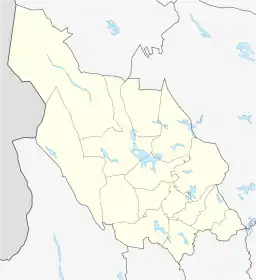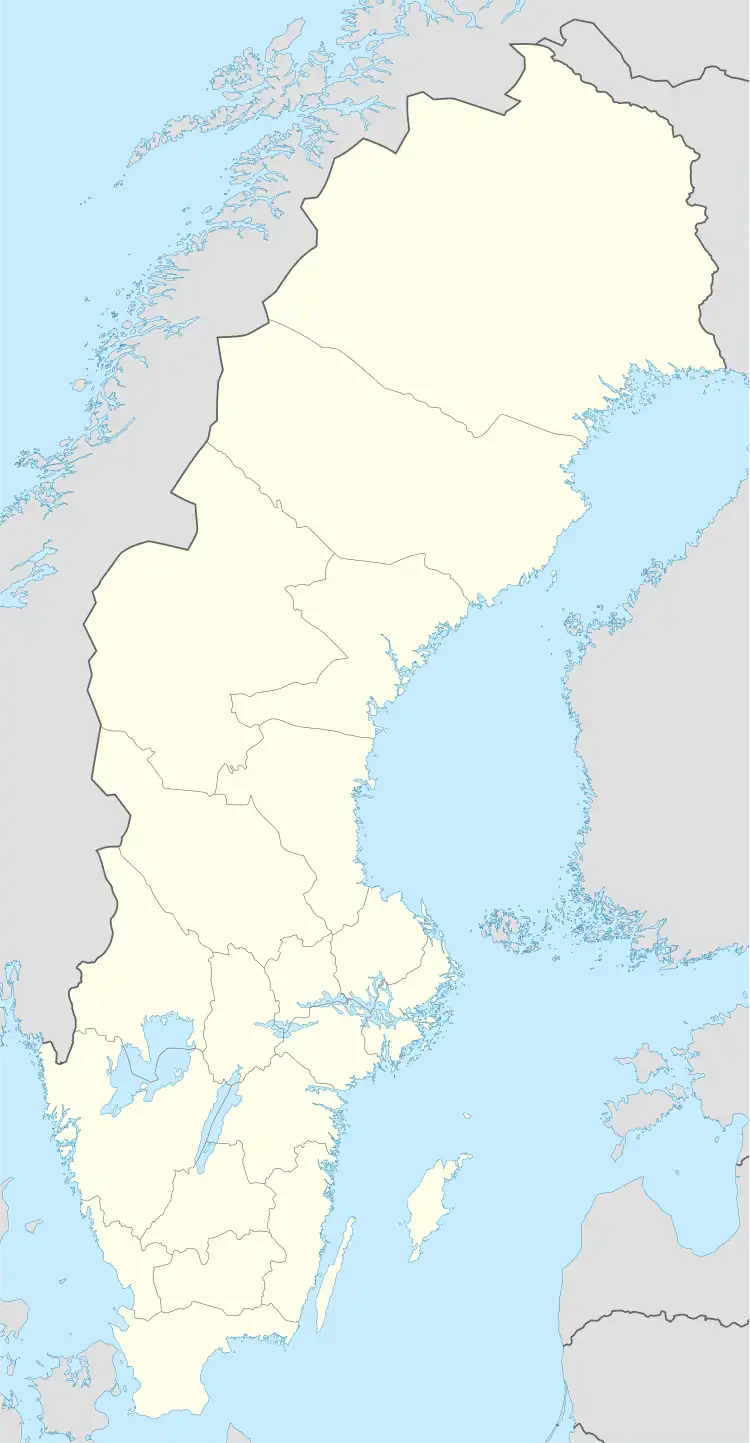Särna | |
|---|---|
 The road entering Särna | |
 Särna  Särna | |
| Coordinates: 61°41′N 13°08′E / 61.683°N 13.133°E | |
| Country | Sweden |
| Province | Dalarna |
| County | Dalarna County |
| Municipality | Älvdalen Municipality |
| Area | |
| • Total | 3.64 km2 (1.41 sq mi) |
| Population (31 December 2010)[1] | |
| • Total | 719 |
| • Density | 197/km2 (510/sq mi) |
| Time zone | UTC+1 (CET) |
| • Summer (DST) | UTC+2 (CEST) |
Särna (Elfdalian: Sjär’n) is a locality situated in Älvdalen Municipality, Dalarna County, Sweden with 719 inhabitants in 2010.[1]
History
The two parishes Särna and Idre were originally part of Norway but were occupied by an expedition of Swedish peasants from Älvdalen in 1644. The 1645 Treaty of Brömsebro was ambiguous regarding the status of the parishes, but when the exact path of the border was to be decided in 1751, Norway accepted a border west of Idre and Särna.
During the German occupation of Norway 1940-45 Särna was considered the only safe escape to Sweden because its police was the only reliable anti-Nazi police along the border.
In 1971, the three municipalities Särna, Idre (which itself had been split off from Särna in 1916) and Älvdalen were amalgamated to form the present municipality of Älvdalen.
Riksdag elections
| Year | % | Votes | V | S | MP | C | L | KD | M | SD | NyD | Left | Right |
|---|---|---|---|---|---|---|---|---|---|---|---|---|---|
| 1973[2] | 75.6 | 856 | 7.4 | 52.2 | 25.2 | 9.2 | 2.1 | 3.5 | 59.6 | 38.0 | |||
| 1976[3] | 81.7 | 923 | 5.7 | 54.4 | 24.1 | 8.7 | 2.2 | 4.6 | 60.1 | 37.3 | |||
| 1979[4] | 80.4 | 916 | 4.1 | 57.5 | 21.1 | 7.5 | 2.3 | 7.4 | 61.7 | 36.0 | |||
| 1982[5] | 83.7 | 949 | 4.3 | 59.2 | 0.4 | 19.8 | 4.6 | 1.7 | 10.1 | 63.3 | 34.6 | ||
| 1985[6] | 75.1 | 832 | 5.0 | 56.1 | 1.6 | 18.3 | 8.3 | 10.5 | 61.2 | 37.0 | |||
| 1988[7] | 75.6 | 790 | 6.3 | 60.6 | 3.8 | 13.7 | 6.5 | 2.3 | 6.8 | 70.8 | 27.0 | ||
| 1991[8] | 76.4 | 811 | 6.9 | 53.9 | 2.1 | 12.3 | 5.4 | 4.1 | 8.6 | 6.3 | 60.8 | 30.5 | |
| 1994[9] | 79.9 | 840 | 7.5 | 62.1 | 3.0 | 11.1 | 3.9 | 1.9 | 8.6 | 1.5 | 72.6 | 25.5 | |
| 1998[10] | 64.1 | 626 | 16.6 | 52.7 | 3.5 | 8.0 | 2.6 | 5.6 | 10.1 | 72.8 | 26.2 | ||
| 2002[11] | 66.4 | 630 | 8.6 | 56.5 | 4.3 | 9.2 | 6.0 | 5.6 | 7.3 | 0.2 | 69.4 | 28.1 | |
| 2006[12] | 72.5 | 646 | 6.2 | 47.8 | 1.7 | 10.1 | 3.3 | 3.4 | 16.1 | 3.7 | 55.7 | 32.8 | |
| 2010[13] | 75.7 | 655 | 5.5 | 48.4 | 1.4 | 8.7 | 1.5 | 2.6 | 19.7 | 10.5 | 55.3 | 32.5 | |
| 2014[14] | 82.2 | 649 | 4.9 | 43.3 | 0.6 | 7.4 | 1.2 | 2.6 | 12.3 | 25.1 | 48.8 | 23.6 | |
| 2018[15] | 81.0 | 621 | 4.8 | 30.3 | 0.8 | 7.2 | 2.4 | 6.3 | 9.0 | 36.9 | 43.2 | 54.6 |
Climate
Särna has a continentally-influenced subarctic climate with mild summers and cold winters. The cold extremes in winter are associated with the high altitude and being the Scandinavian spot farthest from the sea. This in turn also contributes to high diurnal temperature variation and significant frost has been recorded in all months of the year.
| Climate data for Särna (2002–2018 averages; precipitation 1961–1990; extremes since 1901) | |||||||||||||
|---|---|---|---|---|---|---|---|---|---|---|---|---|---|
| Month | Jan | Feb | Mar | Apr | May | Jun | Jul | Aug | Sep | Oct | Nov | Dec | Year |
| Record high °C (°F) | 9.1 (48.4) |
9.4 (48.9) |
14.6 (58.3) |
20.6 (69.1) |
27.8 (82.0) |
33.0 (91.4) |
32.5 (90.5) |
31.9 (89.4) |
26.2 (79.2) |
19.8 (67.6) |
12.2 (54.0) |
8.8 (47.8) |
33.0 (91.4) |
| Mean maximum °C (°F) | 3.4 (38.1) |
4.3 (39.7) |
9.4 (48.9) |
14.9 (58.8) |
22.7 (72.9) |
25.6 (78.1) |
27.3 (81.1) |
25.1 (77.2) |
20.2 (68.4) |
13.6 (56.5) |
7.4 (45.3) |
4.2 (39.6) |
28.5 (83.3) |
| Mean daily maximum °C (°F) | −5.6 (21.9) |
−3.3 (26.1) |
2.2 (36.0) |
7.9 (46.2) |
13.9 (57.0) |
18.2 (64.8) |
21.1 (70.0) |
18.7 (65.7) |
13.9 (57.0) |
6.3 (43.3) |
0.2 (32.4) |
−4.2 (24.4) |
7.4 (45.4) |
| Daily mean °C (°F) | −10.7 (12.7) |
−8.9 (16.0) |
−4.2 (24.4) |
2.1 (35.8) |
8.0 (46.4) |
12.2 (54.0) |
15.2 (59.4) |
13.3 (55.9) |
9.0 (48.2) |
2.4 (36.3) |
−3.3 (26.1) |
−8.8 (16.2) |
2.2 (35.9) |
| Mean daily minimum °C (°F) | −15.7 (3.7) |
−14.4 (6.1) |
−10.6 (12.9) |
−3.7 (25.3) |
2.0 (35.6) |
6.1 (43.0) |
9.3 (48.7) |
7.8 (46.0) |
4.0 (39.2) |
−1.6 (29.1) |
−6.8 (19.8) |
−13.4 (7.9) |
−3.1 (26.4) |
| Mean minimum °C (°F) | −31.2 (−24.2) |
−30.8 (−23.4) |
−25.7 (−14.3) |
−13.0 (8.6) |
−5.0 (23.0) |
−0.8 (30.6) |
2.3 (36.1) |
0.3 (32.5) |
−3.0 (26.6) |
−12.3 (9.9) |
−18.8 (−1.8) |
−27.5 (−17.5) |
−34.5 (−30.1) |
| Record low °C (°F) | −46.0 (−50.8) |
−41.2 (−42.2) |
−37.6 (−35.7) |
−30.0 (−22.0) |
−14.0 (6.8) |
−6.2 (20.8) |
−4.0 (24.8) |
−4.0 (24.8) |
−10.0 (14.0) |
−25.0 (−13.0) |
−35.6 (−32.1) |
−42.5 (−44.5) |
−46.0 (−50.8) |
| Average precipitation mm (inches) | 43.3 (1.70) |
30.4 (1.20) |
21.6 (0.85) |
26.6 (1.05) |
62.4 (2.46) |
68.9 (2.71) |
80.8 (3.18) |
97.5 (3.84) |
55.5 (2.19) |
52.9 (2.08) |
47.7 (1.88) |
38.5 (1.52) |
626.1 (24.66) |
| Source 1: SMHI Open Data[16] | |||||||||||||
| Source 2: SMHI climate data 2002–2018[17] | |||||||||||||
 Särna
Särna Särna church
Särna church
References
- 1 2 3 "Tätorternas landareal, folkmängd och invånare per km2 2005 och 2010" (in Swedish). Statistics Sweden. 14 December 2011. Archived from the original on 27 January 2012. Retrieved 10 January 2012.
- ↑ "Allmänna valen 1973" (PDF) (in Swedish). SCB.
- ↑ "Allmänna valen 1976" (PDF) (in Swedish). SCB.
- ↑ "Allmänna valen 1979" (PDF) (in Swedish). SCB.
- ↑ "Allmänna valen 1982" (PDF) (in Swedish). SCB.
- ↑ "Allmänna valen 1985" (PDF) (in Swedish). SCB.
- ↑ "Allmänna valen 1988" (PDF) (in Swedish). SCB.
- ↑ "Allmänna valen 1991" (PDF) (in Swedish). SCB.
- ↑ "Allmänna valen 1994" (PDF) (in Swedish). SCB.
- ↑ "Allmänna valen 1998" (PDF) (in Swedish). SCB.
- ↑ "Särna - summering" (in Swedish). Valmyndigheten.
- ↑ "Särna - Allmänna val 17 september 2006" (in Swedish). Valmyndigheten.
- ↑ "Särna - Röster Val 2010" (in Swedish). Valmyndigheten.
- ↑ "Särna - Röster Val 2014" (in Swedish). Valmyndigheten.
- ↑ "Särna - Röster Val 2018" (in Swedish). Valmyndigheten.
- ↑ "SMHI Open Data" (in Swedish). Swedish Meteorological and Hydrological Institute.
- ↑ "Yearly & Monthly statistics" (in Swedish). SMHI. 3 May 2019.
External links
![]() Media related to Särna at Wikimedia Commons
Media related to Särna at Wikimedia Commons